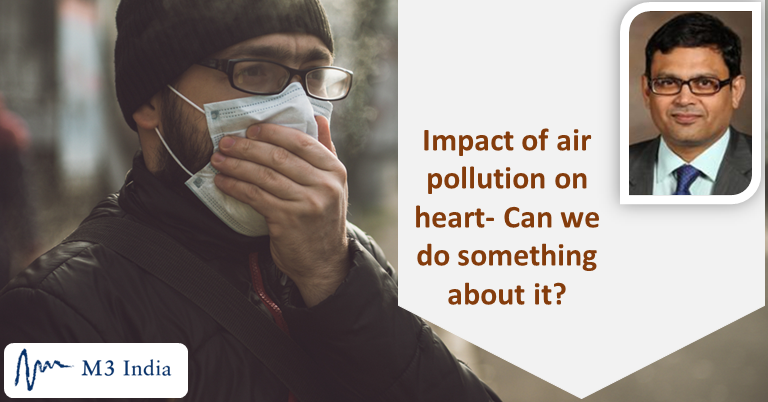"Impact of air pollution on heart- Can we do something about it?" asks Dr. Sundeep Mishra
M3 India Newsdesk Dec 29, 2019
Prof. Dr. Sundeep Mishra writes about the effects of air pollution on heart health and smog being a major contributor to the rise in cardiovascular disease and mortality.

Smog and cardiovascular health
Air pollution is a significant environmental and health hazard. Smog is a man-made air pollution derived from coal combustion emissions, vehicular emissions, industrial emissions, forest and agricultural fires and photochemical reactions of these emissions. The problem was first brought into public attention by something known as “Big Smoke” or Great smog of 1952, an episode of severe air-pollution that affected London in December 1952.
Big smoke was essentially a collection of airborne particles, arising mostly from the use of coal, culminating in a thick layer of smog over the city, lasting 5 days (from 5–9 December 1952) and then dispersing as quickly as it came. Since London at that time was already accustomed to heavy fogs, no special attention was paid to it, certainly there was no panic; it just seemed a denser and a longer standing fog.
The only apparent problem that seemed to be faced by the general public was a low visibility that made driving almost impossible, and thus all public transport ceased, ambulance service stopped functioning and all outdoor sporting events were called off. Moreover, the fog even seeped indoors, resulting in the cancellation/abandonment of concerts and movies, since stage could not be viewed from the seats.
However, the health aspects became apparent only after few weeks when medical statistics revealed that this deadly fog, more aptly called “smog” had killed 4000 people. As a matter of fact, mortality remained elevated for months. The cause of increased mortality was initially attributed to the pulmonary system; asthma, respiratory tract infections: influenza, bronchopneumonia and purulent bronchitis but all this remained speculative because of faulty records.
It was only more than 4 decades later that the Harvard Six Cities study, with a large prospective cohort, for the first time, convincingly demonstrated a definite relation between long term environmental pollution exposure and adverse health outcomes. Thus, since the earliest times, several myths have been perpetrated in context of air pollution and health hazards. Earlier studies had examined the adverse health effects associated with short- and long-term exposure to particulate matter on respiratory disease.
However, later studies demonstrated that it was actually cardiovascular disease that accounted for majority of mortality. Furthermore, it was not gaseous pollutants like oxides of nitrate, sulfur, carbon mono-oxide or ozone but the particulate matter or PM, of fine or coarse size (PM2.5 and PM10) which was linearly associated with mortality; PM2.5 with long term and PM10 with short term. Several cardiovascular diseases are associated with pollution; acute myocardial infarction, heart failure, cardiac arrhythmias, atherosclerosis and cardiac arrest.
Myths associated with air pollution
| MYTH | REALITY |
| Fog/smog is innocuous | Smog has definitive adverse health effects |
| Health effects of air pollution are related to respiratory system | Majority of deaths related to pollution are due to cardiovascular diseases |
| Gaseous pollutants are major causes of health effects | Particulate matter in the air are most strongly related to health effects |
| The health effects are instantaneous | Health effects are both instantaneous and can occur after a lag period |
Can the effects of pollution be reversed?
The ideal way to address this problem is through regulation; adhering to stringent environmental standards of pollutants. However several individual steps can also be undertaken; choosing to stay indoors (on high pollution days), reducing outdoor air permeation to inside, purifying indoor air using air filters, and also limiting outdoor physical activity near source of air pollution can help. Nutritional anti-oxidants like statins or Mediterranean diet, and aspirin have not been associated with reduced risk but specific nutritional agents like broccoli, cabbage, cauliflower or brussels sprouts, fish oil supplement may help. Use of face-mask has been controversial but may be useful if particulate matter load is higher.
Tips to reduce health risk in individuals exposed to air pollution
- During high pollution days stay indoors, avoid physical exertion in an outdoor activity located near the source of pollution
- Reduce outdoor air permeation to inside
- Purifying indoor air using air filters
- Some foods rich in sulphorane based antioxidants like broccoli, cabbage, cauliflower, brussels sprouts
- Fish oil supplementation
- Use of respirators – face mask
This article was originally published on June 18, 2019.
Disclaimer- The views and opinions expressed in this article are those of the author's and do not necessarily reflect the official policy or position of M3 India.
The writer, Dr. Sundeep Mishra is a Professor of Cardiology.
-
Exclusive Write-ups & Webinars by KOLs
-
Daily Quiz by specialty
-
Paid Market Research Surveys
-
Case discussions, News & Journals' summaries